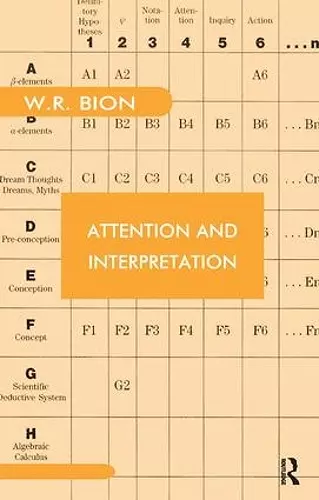Attention and Interpretation
Format:Paperback
Publisher:Taylor & Francis Ltd
Published:31st Dec '84
Currently unavailable, and unfortunately no date known when it will be back
This paperback is available in another edition too:
- Hardback£135.00(9780367323400)

Bion's central thesis in this volume is that for the study of people, whether individually or in groups, a cardinal requisite is accurate observation, accompanied by accurate appreciation and formulation of the observations so made. The study represents a further development of a theme introduced in the author's earlier works, particularly in Elements of Psychoanalysis (1963) and Transformations (1965). Bion's concern with the subject stems directly from his psycho-analytic experience and reflects his endeavor to overcome, in a scientific frame of reference, the immense difficulty of observing, assessing, and communicating non-sensuous experience.Here, he lays emphasis on he overriding importance of attending to the realities of mental phenomena as they manifest themselves in the individual or group under study. In influences that interpose themselves between the observer and the subject of his scrutiny giving rise to opacity, are examined, together with ways of controlling them. Problems of language are considered: In order to express and communicate, the analyst is obliged to use words and formulations deriving from a background of sensuous experience and designed for a different task. Furthermore, the author says "It is too often forgotten that the gift of speech, so centrally employed, has been elaborated s much for the purpose of concealing thought by dissimulation and lying as for the purpose of elucidating or communicating thought".The practical value of this volume for those engaged in psycho-analytic work is self-evident; furthermore, its implications extend to many other areas of study. The discussion is wide-ranging: based on Kleinian theory, it encompasses theological dogma and mathematics, and the relationships between these fields. In particular, an attempt is made to show the analogy of certain psychological concepts with mathematical formulations such as set theory.Readers already familiar with Bion's work will welcome this further statement of his views. Those encountering his writing for the first time will at once perceive the originality of his approach and the precision of his theoretical exposition.
Bion's central thesis in this volume is that for the study of people, whether individually or in groups, a cardinal requisite is accurate observation, accompanied by accurate appreciation and formulation of the observations so made. The study represents a further development of a theme introduced in the author's earlier works, particularly in Elements of Psychoanalysis (1963) and Transformations (1965). Bion's concern with the subject stems directly from his psycho-analytic experience and reflects his endeavor to overcome, in a scientific frame of reference, the immense difficulty of observing, assessing, and communicating non-sensuous experience.Here, he lays emphasis on he overriding importance of attending to the realities of mental phenomena as they manifest themselves in the individual or group under study. In influences that interpose themselves between the observer and the subject of his scrutiny giving rise to opacity, are examined, together with ways of controlling them. Problems of language are considered: In order to express and communicate, the analyst is obliged to use words and formulations deriving from a background of sensuous experience and designed for a different task. Furthermore, the author says "It is too often forgotten that the gift of speech, so centrally employed, has been elaborated s much for the purpose of concealing thought by dissimulation and lying as for the purpose of elucidating or communicating thought".The practical value of this volume for those engaged in psycho-analytic work is self-evident; furthermore, its implications extend to many other areas of study. The discussion is wide-ranging: based on Kleinian theory, it encompasses theological dogma and mathematics, and the relationships between these fields. In particular, an attempt is made to show the analogy of certain psychological concepts with mathematical formulations such as set theory.Readers already familiar with Bion's work will welcome this further statement of his views. Those encountering his writing for the first time will at once perceive the originality of his approach and the precision of his theoretical exposition.
ISBN: 9780946439089
Dimensions: unknown
Weight: unknown
144 pages